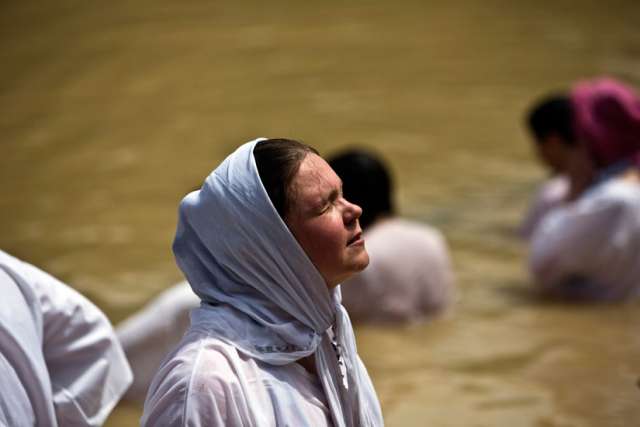Baptism of the Lord (Year B) Jan. 11 (Isaiah 55:1-11; Isaiah 12; 1 John 5:1-9; Mark 1:7-11)
God is not like human beings — and we can rejoice in that. In fact, Isaiah went to great lengths to highlight the wide gulf between divine and human reasoning. This is certainly evident in the fact that God offers food and drink in abundance to all those who hunger and thirst absolutely free and without any preconditions.
God’s plan leaves no one out
By Fr. Scott Lewis, S.JEpiphany of the Lord (Year B) Jan. 4 (Isaiah 60:1-6; Psalm 72; Ephesians 3:2-3a, 5-6; Matthew 2:1-12)
Isaiah painted an inspiring and hope-filled picture of Israel’s future. His words must have been a welcome balm for a dispirited and discouraged people. The day would come when the radiance of God’s light and glory would be so overwhelming that it would stand as a beacon for the whole world. They were to ignore the seeming darkness around them and look to God’s glorious future.
Abraham’s leap of faith bore much fruit
By Fr. Scott Lewis, S.JHoly Family (Year B) Dec. 28 (Genesis 15:1-6; 17:3b-5, 15-16; 21:1-7; Psalm 105; Hebrews 11:8, 11-12, 17-19; Luke 2:22-40)
Even though Abraham is our father in faith because he trusted in God, that faith was sorely tested. Abraham had left everything behind — his land, kin and security — and became a wanderer, going wherever God led him.
Christmas’ checkered origins and sequence
By Fr. Ron RolheiserIf someone who had never heard the story of Jesus were to ask about His origins, we would, I suspect, begin with the story of His annunciation and birth and end with the story of His resurrection and ascension. While that does capture His life, that’s not how the Gospels either begin or end His story. The story of Jesus and the meaning of Christmas can only really be understood by looking at where Jesus came from, His family tree, and by looking at how His story has continued in history. Indeed, that’s how the Gospels tell His story.
Let us be servants of the Lord
By Fr. Scott Lewis, S.JWe are often eager to do favours for others without considering how they might feel about it. Do they really want or need what we have in mind? Are we satisfying our own needs under the guise of being openhanded and generous? This is even more the case when God is the recipient of our favours and gifts.
Does God want or need what we offer?
Two churches, two sacred places, two struggles
By Fr. Ron RolheiserGod has given us two churches, one is found everywhere and the other is found at select places. Some of us prefer one of these and struggle with the other, but both are sacred places where God can be found and worshipped.
Light shines forth even amid the darkness
By Fr. Scott Lewis, S.JThird Sunday of Advent (Year B) Dec. 14 (Isaiah 61:1-2a, 10-11; Luke 1; 1 Thessalonians 5:16-24; John 1:6-8, 19-28)
What would good news sound like in our world? A steady diet of negativity reported by the news media can leave one feeling depressed, fearful, hopeless and helpless. Often people turn to pain-numbing diversions of every variety to escape the darkness and confusion around them.
Go and see she has salvation in her arms
By Mary Marrocco“Let’s go to Bethlehem,” we students agreed with one another. We were enrolled in a summer course in Jerusalem, through a program called Bat Kol which the Sisters of Sion generously invited me to attend. The final free Saturday was approaching. We wanted to make the trip before returning home.
Better churches will keep people in the pews
By Fr. Ron RolheiserIt’s no secret that today there’s been a massive drop-off in church attendance. Moreover that drop-off is not paralleled by the same widespread growth in atheism and agnosticism.
God is patient, merciful in action
By Fr. Scott Lewis, S.JSecond Sunday of Advent (Year B) Dec. 7 (Isaiah 40:1-5, 9-11; Psalm 85; 2 Peter 3:8-14; Mark 1:1-8)
Anyone who has accompanied someone who is deep in grief or suffering knows how difficult it is to find the right words. In fact, most of the time it is better to say very little — presence and comfort go a long way. Above all, explanations or “answers” are seldom helpful.
Waging spiritual warfare on evil
By Fr. Ron RolheiserSpiritual literature has always highlighted the primordial struggle between good and evil, and this has generally been conceived of as a war, a spiritual battle. Thus, as Christians, we have been warned that we must be vigilant against the powers of Satan and various other forces of evil. And we’ve fought these powers not just with prayer and private moral vigilance but with everything from Holy Water, to exorcisms, to a dogmatic avoidance of everything to do with the occult, the paranormal, alchemy, astrology, spiritualism, etc. For Christians these were seen as dangerous venues through which malevolent spirits could enter our lives and do us harm.












